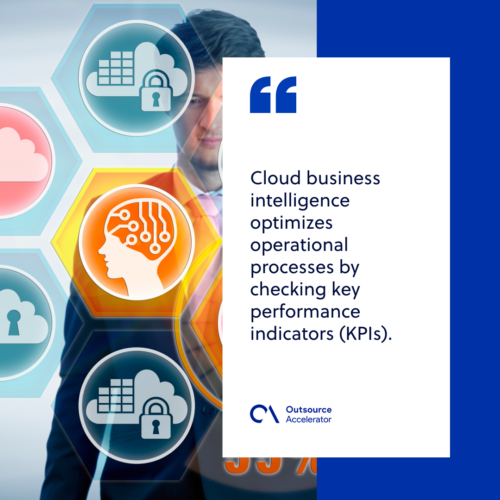Why cloud business intelligence is the future of data analysis

With businesses generating more data than ever, there is a growing need for technologies and practices to help make sense of it all. That’s why business intelligence (BI) is used for interpreting and presenting data to make informed decisions.
Cloud business intelligence has emerged as a powerful tool to harness data’s potential. Its benefits go beyond traditional on-premises solutions and can change how companies analyze data.
Forbes shared that 54% of enterprises claim cloud business intelligence is critical to their current and future plans.
Let’s take a closer look at cloud business intelligence and explore its applications. We’ll also discuss the future trends that shape cloud BI’s evolution in today’s data-driven environment.
What is cloud business intelligence (BI)?
Cloud business intelligence (aka cloud BI) delivers business intelligence services through cloud computing infrastructure.
It enables organizations to:
- Access and analyze data from multiple sources
- Generate meaningful insights
- Make data-driven decisions instantaneously
Cloud BI offers a flexible and scalable solution that eliminates the need for on-site infrastructure and empowers businesses to focus on their core competencies.

How business intelligence relates to cloud computing
Cloud business intelligence leverages the power of cloud computing to provide scalable and cost-effective data analysis solutions.
Organizations can store and process vast amounts of data by using cloud resources. They can do so without investing in expensive hardware and infrastructure.
Cloud computing enables seamless collaboration, data sharing, and accessibility from anywhere. This makes it an ideal platform for business intelligence.
How does cloud business intelligence work?
Cloud BI transfers large volumes of data to the cloud, where it is stored and processed. Here is a high-level overview of its workflow:
- Data extraction – Relevant data is collected from various sources. These sources can be databases, data warehouses, and external APIs.
- Data transformation – The extracted information undergoes cleansing, normalization, and integration. This step ensures its consistency and accuracy.
- Data loading – The transformed data is loaded into a cloud-based storage system. Information can be put into a data lake, warehouse, or mart.
- Data analysis – Cloud BI tools enable users to explore, query, and analyze information. This step uses techniques like data mining, statistical analysis, and machine learning.
- Data visualization – The analyzed data is visualized through interactive dashboards, charts, and graphs. This stage provides intuitive insights to decision-makers.
- Reporting and collaboration – Cloud BI platforms facilitate the creation of comprehensive reports. Teams across the company can share and work on these reports.
Advantages of cloud business intelligence
Cloud business intelligence offers numerous benefits compared to traditional on-premises solutions.
Adaptability
Cloud BI solutions allow organizations to expand their data analysis capabilities seamlessly. That’s because cloud resources can be adjusted to accommodate changing data volumes.
Additionally, cloud business intelligence lets users access data and insights from any device connected to the internet.
Saves on cost
Businesses leveraging cloud infrastructure can reduce upfront hardware, software licenses, and maintenance costs.
Cloud business intelligence operates on a pay-as-you-go model. This means you only pay for the resources you use. This cost-efficiency makes cloud BI accessible to enterprises of all sizes.
Gives real-time insights
Cloud BI provides firms with up-to-date insights into their operations. Regular monitoring helps identify trends, detect anomalies, and respond quickly to market changes.
This agility is critical for staying competitive in the current fast-paced business environment.
Enhances security and data governance
Cloud business intelligence platforms use advanced encryption techniques to protect sensitive information. Cloud service providers adhere to strict compliance regulations. This guarantees data privacy and maintains high levels of security.
Cloud BI also allows for centralized data governance. This eases administrative control and access management.
Simplifies integration and collaboration
Cloud BI can integrate with other cloud-based applications and services. It works well with customer relationship management (CRM) systems and enterprise resource planning (ERP) software.
This integration fosters collaboration, streamlines workflows, and allows cross-functional data analysis. Therefore, cloud business intelligence leads to more comprehensive insights and informed decision-making.

Where is cloud business intelligence used?
Cloud business intelligence finds applications across various domains. Let’s explore some of the key areas where organizations leverage cloud BI:
Reporting
Cloud BI simplifies generating insightful reports by providing intuitive interfaces and drag-and-drop functionalities.
With cloud business intelligence, users can:
- Create customized reports
- Automate report generation
- Share reports with stakeholders
Customer insights
Cloud BI can evaluate customer data and gain valuable insights. This provides a look into consumer preferences, behavior patterns, and purchasing habits.
By leveraging this information, businesses can:
- Personalize their marketing strategies
- Improve customer satisfaction
- Drive revenue growth
Operational efficiency
Cloud business intelligence optimizes operational processes by checking key performance indicators (KPIs). It lets you see areas that need to be improved.
By visualizing operational data in real-time, companies can:
- Streamline workflows
- Enhance resource allocation
- Maximize overall efficiency
Data visualization
Cloud BI tools offer advanced data visualization capabilities. They represent complex data sets in a visually appealing and understandable format.
Interactive dashboards, charts, and graphs enable users to:
- Explore data
- Identify trends
- Uncover hidden patterns effortlessly
Predictive analytics
Cloud BI uses predictive analytics algorithms to forecast future trends, outcomes, and behaviors. It does this by using historical data as a base source.
Predictive analytics lets companies:
- Make proactive decisions
- Anticipate market demands
- Stay ahead of the competition
Augmented analytics
Augmented analytics combines cloud BI with artificial intelligence (AI) and machine learning (ML). It empowers users to gain deeper insights and make data-driven decisions effortlessly.
Augmented analytics can:
- Automate data analytics
- Reduce manual efforts
- Permit businesses to focus more on value-added tasks
- Enhance the accuracy and speed of decision-making
Steps in implementing cloud business intelligence
Here are some key steps to implement cloud business intelligence successfully:
1. Identify your work goals and objectives
Before adopting a cloud BI solution, clearly define your business goals and objectives. Using data analysis, understand the specific insights and outcomes you want to achieve.
This clarity will guide you in selecting and configuring the appropriate cloud BI tools.
2. Choose the right cloud business intelligence solution provider
Evaluate cloud BI solution providers based on their:
- Features
- Scalability
- Security measures
- Pricing models
- Customer support
Choose a cloud BI solutions partner that aligns with your organization’s needs. It’s a plus if they offer a user-friendly interface, robust data integration, and reliable customer service.
3. Ensure data quality and integrity
Data quality is crucial for effective data analysis. Establish data cleansing and validation processes to ensure accuracy and consistency.
Install policies that maintain data integrity, enforce security measures, and follow industry regulations.
4. Establish a data governance framework
Develop a comprehensive data governance plan that includes data access controls, privacy policies, and data retention guidelines.
Determine data management roles and responsibilities and establish data sharing and collaboration protocols.
5. Train and educate employees on using cloud BI tools
Invest in training programs to educate workers on how to use cloud BI tools effectively. Giving continuous support and encouraging a data-driven culture within the company is important.
It’s also vital to foster collaboration between business users and IT teams. This makes the most of cloud business intelligence’s value and benefits.
Future of cloud business intelligence
As technology advances, cloud BI is expected to evolve and shape the future of data analysis. Here are some trends that will drive the future of this system:
Artificial intelligence and machine learning
Integrating AI and ML with cloud BI platforms will enable businesses to leverage advanced algorithms. These technologies can aid in better data analysis, pattern recognition, and predictive modeling.
Pairing AI and ML to cloud BI will improve the accuracy and speed of insights generation. This permits businesses to be smarter about decision-making.

Natural language processing (NLP) and conversational analytics
Cloud BI will increasingly incorporate NLP capabilities. It does so by interacting with data using spoken or written language.
Furthermore, conversational analytics lets users ask questions, receive relevant insights, and make data-driven decisions. This is possible through chatbots or voice assistants.
Embedded analytics
Cloud business intelligence will become more embedded within various business applications. Therefore, companies can directly access data analysis and insights within their existing workflows.
This integration will eliminate the need for switching between different tools. It also promotes a seamless user experience.
Edge analytics
With the rise of the Internet of Things (IoT), cloud BI will extend its reach to edge devices. This furthers immediate data analysis and insights generation at the network’s edge.
Edge analytics will facilitate faster decision-making and reduce latency. This is true, particularly in industries where immediate action is critical.
Enhanced data visualization techniques
Cloud business intelligence will continue to innovate in data visualization. It will offer more interactive and immersive techniques, such as virtual reality (VR) and augmented reality (AR).
These advancements will allow firms to explore and understand complex data sets better.
Mobile business intelligence
The future of mobile BI and cloud BI is tightly intertwined, creating a virtuous cycle. Progress in mobile technology will continue to drive mobile BI adoption. This pushes for more innovative solutions in the cloud.
At the same time, the rapid growth of cloud computing will drive cloud BI adoption. It lets mobile devices access data more efficiently, especially as networks evolve.







 Independent
Independent




